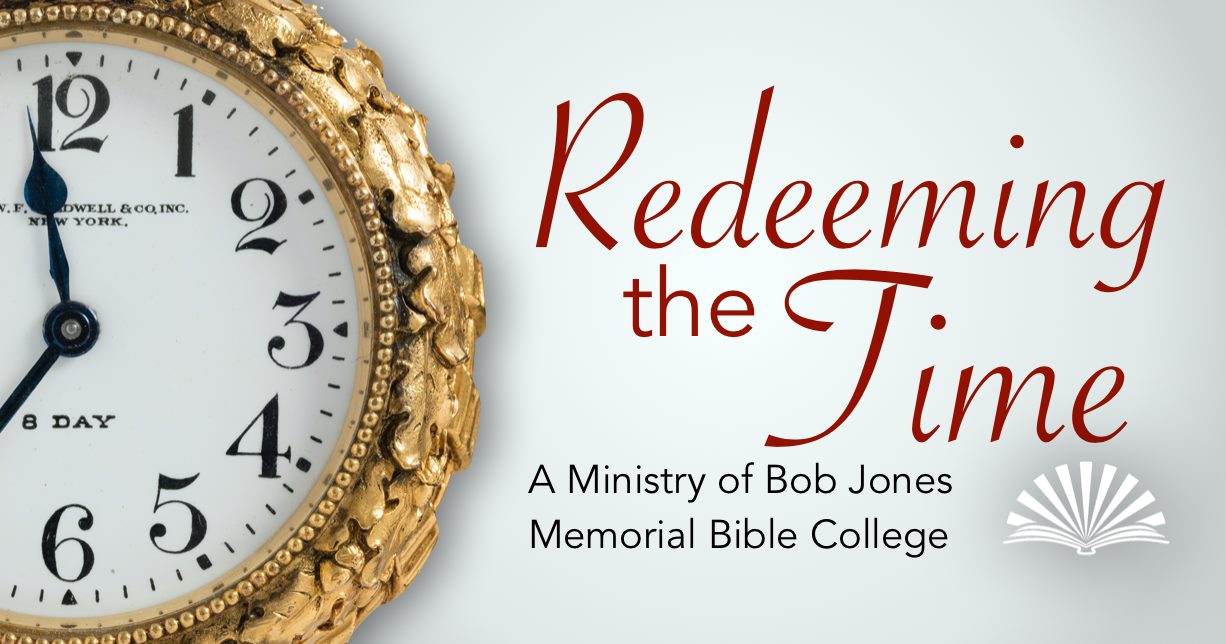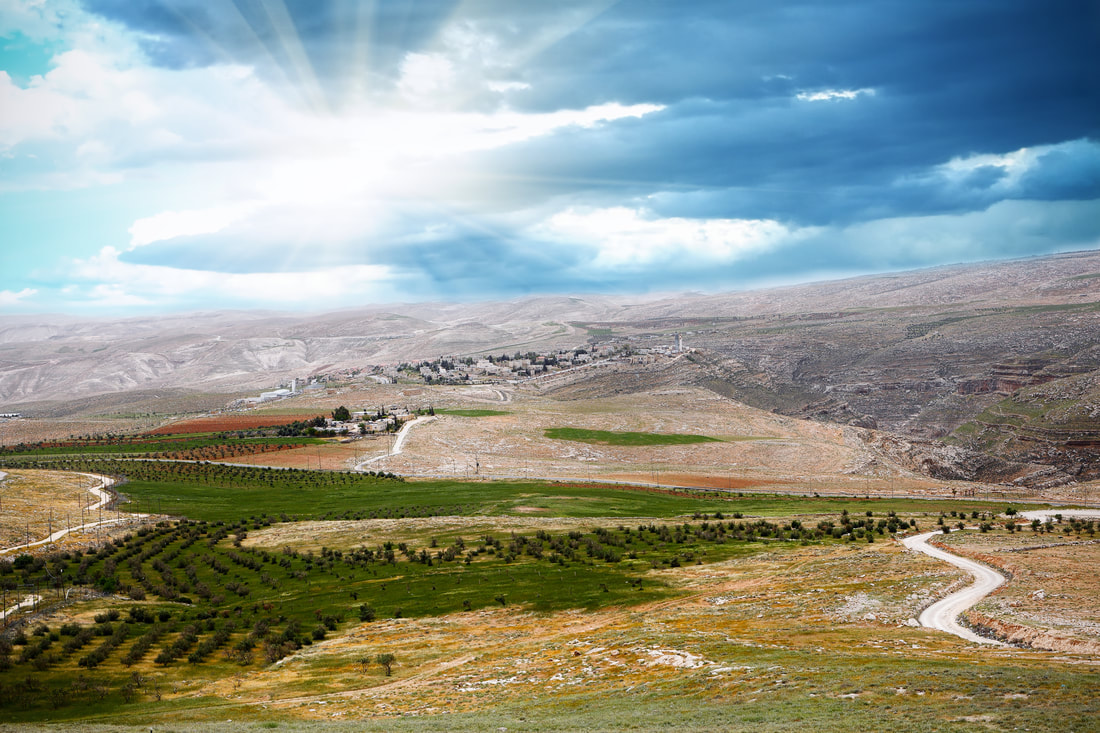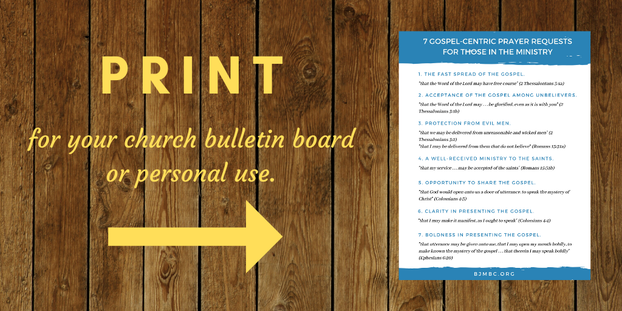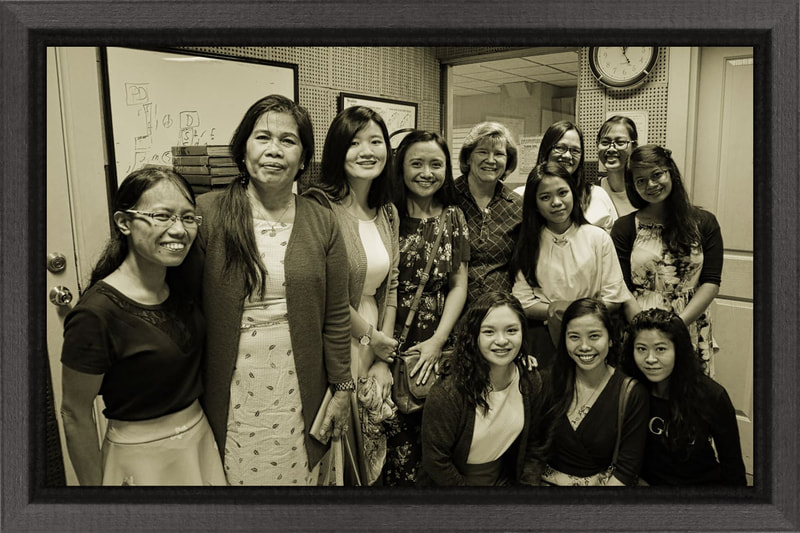|
By BJMBC Faculty Four identifiers that mark where BJMBC stands Where BJMBC StandsWe live in a time when leaders, organizations, denominations, and churches are changing. Change is not inherently wrong. None of us brings a bullock to a tent on Saturday, cuts its throat, and offers it on an altar! On the other hand, change can be in the wrong direction. Sadly, the church that Jesus Christ said He would build sometimes does move away from Him instead of toward Him. The next several blogs will help you understand where BJMBC stands and the kinds of changes we are not willing to make. Let's start with a clarification related to our name. Obviously, our name connects us to Bob Jones University. After all, we are Bob Jones Memorial Bible College. Sometimes people mistakenly assume some organic connection between us and Bob Jones University. Actually, there is no official connection between BJMBC and BJU. We receive no financial help from BJU. We are not an Asian branch or extension of BJU. We are not under the administrative oversight of BJU. Not in any way. Our name does not reflect official attachment but rather the appreciation by BJMBC's founders for what they received at BJU years ago. They especially appreciate the heritage put in place by Bob Jones Sr. We at BJMBC do too. Bob Jones Sr. stood for an uncompromising stand on and preaching of the gospel. If you want to catch his heartbeat, watch this video about the life and legacy of Bob Jones. Rather than being a ministry of BJU, BJMBC is actually a ministry of Gospel Fellowship Association. Understanding where GFA stands will help you understand where we stand. The following excerpt from the GFA website explains their stand on "fellowship." "GFA missionaries practice both ecclesiastical and personal separation and compassionately warn about deviation from biblical truth and practice. We partner with independent Baptist and other like-minded churches that practice believer’s baptism by immersion. We are committed to a reverent, conservative worship style. We are also cessationists, believing the sign gifts have ceased." The excerpt above suggests at least four identifiers to clarify where both GFA and BJMBC (a ministry of GFA) stand.
1. We are committed to the doctrine of separation and identify with the fundamentalist movement. First, we are committed to the doctrine of separation, which means we identify ourselves as fundamentalists or part of the movement known as fundamentalism. In the Philippines context, this can be a bit confusing since there is a fellowship of Baptist churches (Association of Fundamental Baptist Church of the Philippines) that call themselves "Fundamental.” By referring to ourselves as part of fundamentalism, we are not alluding to this specific fellowship of Baptists, although we hold common cause with the conservative constituents of AFBCP on many issues, but rather we are identifying ourselves with the larger fundamentalist movement. 2. We identify specifically with Baptist fundamentalism. Second, we identify with Baptist fundamentalism. Historic fundamentalism actually included Presbyterians, Methodists, and others who held staunchly to the fundamentals of the faith. Believe it or not there were and are fundamental Presbyterians! But we identify more closely with Baptist fundamentalism, which includes independent Baptist churches and likeminded independent Bible churches. Even though GFA does not have Baptist in its name (and neither does BJMBC), our statement of faith is decidedly Baptistic and virtually all of us identify ourselves as Baptist in faith and practice. For example, every director at BJMBC is a member of a Baptist church. The director of GFA is a member of a Baptist church. And the list could go on. 3. We are conservative in our style of worship. Third, we are conservative in our style of worship. We oppose the contemporary forms of worship often associated with so-called “Praise & Worship.” We are not opposed to recently composed music by conservative composers. We are very supportive of these composers. We stand against contemporary forms of worship that imitate the world such as CCM and its musical cousins. Reverent implies worship that reflects and honors the character of our thrice-holy God. Worship clarifies that the music is for God's enjoyment, not necessarily ours. Musical styles and lyrics that deliberately imitate that of the world surely do not bring enjoyment to a God who has said that friendship with the world is enmity with Him. 4. We are cessationist. Lastly, we are cessationist. We believe that the kinds of apostolic signs and wonders that God worked during the founding era of the church have ceased (thus, the term cessationist). So we disassociate ourselves from the charismatic and/or Pentecostal churches that still look for signs and wonders. Also, a pursuit of signs and wonders often goes along with seeking some kind of second blessing that will catapult its recipient into a higher level of Christian living--almost as if some blessing was missing at the moment of salvation. Spirit baptism now occurs at the moment of salvation, and we have already received the indwelling Spirit and every blessing in heavenly places in Christ. Now we seek to work out this glorious salvation into our daily Christian lives. It is a privilege to stand on the side of God and truth, is it not? It is also a grave responsibility. Over the centuries, ministers and lay people alike have toiled and suffered, sometimes terribly, in order to pass biblical Christianity on to the generations after them. May God help us in our day to hold fast the pattern of sound words (2 Tim. 1:13) and pass it on undiluted to the generations that will come after us!
0 Comments
by Laura Berrey BJMBC's five-pronged approach to redeeming the time while under lockdown. As BJMBC winds down to a close this week with final exams, a major concern for us is that we don't wind down spiritually. With all of Luzon--and many other parts of the Philippines and the world--under a lockdown of some sort or another, we are approaching the end of the school year with the burden to continue our efforts to grow spiritually during this unique time. To this end, BJMBC has put together a five-pronged approach to redeeming the time under lockdown. For each of these five aspects of spiritual growth and ministry we have included a page of resources to empower you to take part. 1. Read the Bible in 40 Days Challenge "Your grandparents were called to war. You are called to sit on the couch and watch Netflix." This meme, which has been floating around social media, is not true for those of us who are Christ followers. We too have been called to warfare, although it is primarily a spiritual warfare. To be effective soldiers of Christ, we need to wield the sword of the Spirit, which is the Word of God. Doing a deep dive into Scripture by binge-reading the Bible is a great way to get a bird's eye view of the big picture of the Word of God from Genesis to Revelation. Reading the Bible in 40 days or 60 days takes time, but it is time well spent. Two of our BJMBC faculty members have chronicled their experiences in reading the entire Bible in a short period of time in these articles: Meditations from Binge-Reading the Bible by Joel Arnold Observations on the 25 Day Bible Reading Challenge by Timothy W. Berrey 2. Feed Your Mind Each Day School may be out for the summer, and you may be quartered in your home, but that doesn't mean it's time to let a screensaver take over your mind. Instead, view this as a God-given opportunity to pursue more individualized learning. Choose a good book, listen to a sermon, or watch some educational and soul-strengthening videos. 3. Help Filipinos dig into God's Word With churches taking place mostly online, many of your normal ministries are probably on hold. But you can still minister and have an eternal impact by helping with this extremely valuable translation project. Work together or with a group. Change the world from inside the four walls of your home. 4. Pray for a World in Crisis This is an unprecedented time in history. Never before has the entire world been under lockdown in an effort to combat a common enemy. Now is not the time to let down our defenses; it is a time to storm the mercy room with petitions for the souls of men. Where two or three are gathered in Christ's name, He is in the midst of them. Let's join in praying for spiritual revival for our needy world as well as physical healing. 5. Share the Gospel of Hope You can't go door-to-door. You probably can't even be handing out tracts right now. But that doesn't mean you can't share the Gospel. Take the time to email, message, or video chat with someone who needs the Gospel. Learn more about how to be an effective soul winner. We hope that you, too, will redeem the time during your lockdown in one or more of these five ways. Our goal at BJMBC is to encourage and strengthen you in your work for Christ. May these resources be a blessing and a help to you as you seek to use this time for the glory of God.
Timothy W. Berrey is the director of Graduate Studies at BJMBC. Tracing the Land of Canaan in Genesis 1-24. We are so accustomed to seeing the expression "the Land of Canaan" in Scripture that we don’t think about its significance. The land of Canaan is the land that belonged to a person named Canaan. By Genesis 12, however, Canaan’s land is being deeded to another man by the name of Abram. What happened? It starts with Noah’s son, Ham, who evidences serious defects in his character (Gen. 9:22). From the way his action leads to a curse upon his son, Canaan, we infer that Ham passed down his immoral bent to Canaan. Ultimately, Canaan’s wicked character causes him to forfeit the rights to his land. God then promises Canaan’s land to Abram, a man who evidences his faith in God by leaving his homeland and family and journeying, sight unseen, to the land of Canaan. Once he arrives in the land, God says to him, “To your offspring I will give this land” (Gen. 12:7). Abram clings to God’s promise, which God confirms at various points in his life, and refuses to go back to the land of his origins. He evidences his faith in God’s promise in a number of ways. He lives in tents, rather than in the cities of Canaan, as he waits for God’s timetable to give him the land. He buries his wife Sarah in Canaan, rather than repatriating her to Ur of the Chaldees. Significantly, he refuses to leave the land of Canaan to find a wife for his heir, Isaac. His actions in Genesis 24 testify to his commitment to the divine plan for his life. He will not marry Isaac to a Canaanite woman but he will not leave Canaan, or allow Isaac to leave Canaan, in order to find a wife from his own relatives. He instead sends his servant. Abram is committed to staying in Canaan and making sure his family stays in Canaan, but he will not become amalgamated with the Canaanites. God’s giving Abraham the land of Canaan is not just about him and his immediate family. From the very beginning, God intends that Abraham become a blessing to all the families of the earth (Gen. 12:3). Canaan will be the place where Abraham’s descendants, to whom Yahweh had promised to be their God (Gen. 17:8), will live. The land of Canaan is where the Israelites, Abraham’s offspring, were to be a kingdom of priests (Exod. 19:6), radiating the knowledge of Yahweh, the one true God, to the ends of the earth. Canaan’s land would also become the place where God provided a substitute sacrifice for mankind. In Abraham’s greatest test, God instructs him to take his son Isaac to the land of Moriah and offer him there as a burnt offering. As Abraham prepares to kill his son, the Lord intervenes, stops the test, and instead provides a ram as a substitute for Isaac. As a result, Abraham names the place “Yahweh Will Provide” (Gen. 22:14). The next phrase in verse 14 clarifies the significance of this place name: “On the mountain of Yahweh, it shall be provided.” The mountain in Moriah on which Abraham offered Isaac would be called the Lord’s mountain, and on that mountain God would provide a substitute. Moriah is mentioned only one other time in the Bible. Solomon, 2 Chronicles 3:1 records, built the Lord’s temple in Jerusalem on Mount Moriah, the same place where some 1000 years earlier Abraham evidenced willingness to offer his son as a burnt offering. About 1000 years after Solomon built the Temple, God did not spare His Son but instead offered Him up for us all. And He sacrificed Him at Jerusalem, the Lord’s mountain, just as Genesis 22:14 had predicted. Jerusalem, of course, is in what was Canaan’s land. A land forfeited because of sin became the place where the penalty for sin was paid. Even in Canaan, we see how grace triumphs over human sin.
Joel Arnold is on the Bible Faculty at BJMBC. Transform your understanding of the Bible with this 25-day sweep through Scripture. Read the Bible in 25 days?!? Another year at BJMBC is nearly finished. The holiday fever has begun as students struggle to stay focused through their last week of classes. But this year we challenged our students to end the year by blowing the top off of their expectations; to do something so radical it sounds impossible and to use their Christmas break in the best possible way. Specifically, we challenged them to read through the entire Bible in 25 days. It’s a little crazy, but less crazy than you think. It’ll take about 2-3 hours per day, starting this Saturday. And now we are inviting you to join us. We have a schedule (see below), a Facebook accountability group to keep everyone motivated, and more than enough excitement. Here are a few practical suggestions to make it possible: Make the Impossible Possible1. Be alert. Don’t read lying down. We all know where that goes. Stand up, or walk around while you read if you need to. 2. Be active. Buy a cheap award Bible and mark as you go. Keep it super simple—underline things that amaze you. But resist the temptation to get too detailed. 3. Be fast. There are times to read the Bible slowly and digest every word. There are other times to just keep moving. The goal is to get a fly-by overview of your entire Bible. Discipline yourself not to stop—just keep moving! 4. Be creative. You could read some books out loud together with friends. (Extra fun is to read it like a play with parts!) Or try reading and listening to an audio book at the same time. I suggest not relying on audio Bibles alone, though—your mind will wander. 5. Be accountable. Have someone hold you accountable, either a friend or a family member. Or join the Facebook group for daily encouragement and check-ins. Why try?Reading the Bible intensely in a short time transforms the way you understand it. Why do we view so much of God’s words to us closed, confusing and opaque? Maybe because we don’t read the whole thing! Or maybe because even when we do, it is spread out too far for us to notice the constant, rich patterns in the tapestry? The most powerful memory I have with reading Scripture was one Christmas break when I decided to read the Bible in as short a time as possible. It was like flying over Scripture in a helicopter. I’ll never forget it. It changed my life. No question, reading like that is a lot of work. There will be days when you feel like quitting. Life will happen and you’ll have to catch up. But I’m also absolutely certain that no-one who finishes this project will regret it. One month from now, you could have a radically expanded vision of the richness of Scripture. What better thing could you hope to accomplish in the next 25 days? Come join us!
Dr. Atan Taclob is on the Bible Faculty at BJMBC. We know prayer plays a vital role in missions and ministry. But we don't always know how to offer specific, gospel-centered requests for those on the front lines. Here are seven Scripture-based prayer requests we can pray for pastors and missionaries today. In his epistles, the apostle Paul often encourages believers to live a life of prayer. However, there are five passages in which he asks churches to pray for him and his co-laborers in the ministry. 1. “Brethren, pray for us” (1 Thessalonians 5:25). Chronologically, this is the first time Paul asks a church for prayer for himself and his ministry. This general prayer request may sound like it was added hastily or unintentionally at the closing of his letter. But Paul’s request in 1 Thessalonians 5:25 is purposeful and loaded with evangelistic zeal. Behind this general prayer request lies the many conflicts, heartaches, and physical and emotional sufferings that Paul had already suffered during his second missionary journey:
But we can also add to this list the various trials and oppositions that Paul experienced during his first missionary journey:
Although this first passage is somewhat general in nature, the next four passages in which Paul asks for prayer are all very specific in nature. 2. “Finally, brethren, pray for us, that the word of the Lord may have free course, and be glorified, even as it is with you” (2 Thessalonians 3:1). 3. “Now I beseech you, brethren, for the Lord Jesus Christ's sake, and for the love of the Spirit, that ye strive together with me in your prayers to God for me; That I may be delivered from them that do not believe in Judaea; and that my service which I have for Jerusalem may be accepted of the saints; That I may come unto you with joy by the will of God, and may with you be refreshed” (Romans 15:30-32). 4. “Continue in prayer, and watch in the same with thanksgiving; Withal praying also for us, that God would open unto us a door of utterance, to speak the mystery of Christ, for which I am also in bonds: That I may make it manifest, as I ought to speak” (Colossians 4:2-4). 5. “And for me, that utterance may be given unto me, that I may open my mouth boldly, to make known the mystery of the gospel, For which I am an ambassador in bonds: that therein I may speak boldly, as I ought to speak” (Ephesians 6:19-20). 7 Specific Prayer Requests for Those in the MinistryIf we combine all of these prayer requests, it is clear that there are seven specific things for which Paul is asking for prayer. These are the same seven things that we should pray for those who are in the ministry. 1. The fast spread of the gospel. "that the Word of the Lord may have free course" (2 Thessalonians 3:1a) 2. Acceptance of the gospel among unbelievers. "that the Word of the Lord may . . . be glorified, even as it is with you" (2 Thessalonians 3:1b) 3. Protection from evil men. "that we may be delivered from unreasonable and wicked men" (2 Thessalonians 3:2) "that I may be delivered from them that do not believe" (Romans 15:31a) 4. A well-received ministry to the saints. "that my service . . . may be accepted of the saints" (Romans 15:31b) 5. Opportunity to share the gospel. "that God would open unto us a door of utterance, to speak the mystery of Christ" (Colossians 4:3) 6. Clarity in presenting the gospel. "that I may make it manifest, as I ought to speak" (Colossians 4:4) 7. Boldness in presenting the gospel. "that utterance may be given unto me, that I may open my mouth boldly, to make known the mystery of the gospel . . . that therein I may speak boldly" (Ephesians 6:20) These prayer requests all have one thing in common—the gospel. Paul was consumed with the gospel. He lived a gospel-centered life. He petitioned churches for gospel-centered prayers. Knowing that many prayed to God for Paul, can we say that God answered their prayers? Yes! God delivered Paul from many dangers. Through his ministry many souls came to know Christ. Churches were planted and strengthened. And at the end of his life, Paul was able to say, "I have fought a good fight, I have finished the course, I have kept the faith." A crucial part in the success of Paul as a Christian and as a missionary was the fervent prayers of churches to God for him. We also can help other believers succeed in their Christian life and in their ministry by praying for them with these prayer requests in mind. Let us labor in advancing God’s kingdom on earth by praying for one another with these gospel-centered prayer requests. Download a copy of these 7 prayer requests for your church or personal use.
On Tuesday, November 12, BJMBC honored the 70th birthday of Jeanne Raymond, missionary to the Philippines for 34 years. In addition to her work as a homeschool teacher for missionary children, Jeanne taught at BJMBC during many of those years, and has given her students an excellent example of what godly femininity, selfless service to God, and a heart for prayer looks like. During this special chapel service, she also shared the following wise words of advice for the students. Wise Words for Bible College Students1. If you want to know the will of the Lord for your life, the best thing you can do is be in the will of God today. The Lord will lead you by opening up opportunities for you to serve. While you are still in college, get as much experience in ministry as you can, whether that means
2. The Lord usually leads us step-by-step; He doesn't usually lay our whole life out before us. When I graduated from college, the Lord didn't lead me into mission work right away as I thought He would. Instead, He led me into teaching in a Christian school for several years. That was God's preparation for me, because He knew that one day I would be teaching homeschoolers. I also taught a Sunday school class at my home church, went on visitation, helped in the bus ministry, and prepared the devotions for the monthly ladies group. The Lord will be able to use any experiences and education you have for the future. 3. The Lord will lead you by opening opportunities for you to serve and by confirming those through His Word. Before I made the final decision to come to the Philippines, I asked the Lord to confirm His will through His Word. He did that for me through several passages of Scripture. Ask the Lord for confirmation of His will through His Word. In the future, as you face trials that might discourage you, you can lean on those passages for encouragement. 4. Always be flexible when making your own plans. It isn't wrong to plan, but sometimes the Lord has other plans. Be submissive to His will because His plans are always the best. Don't run ahead of the Lord, and don't lag behind. Learn to wait on the Lord. Sometimes we think our timing is better than His, but the Lord is never late. 5. The key to fruitfulness in the ministry is how much time we spend with the Lord each day. If we spend little time reading His Word and praying, we will accomplish little that has lasting eternal results. Serving the Lord is less doing and more being: specifically, being right with the Lord. Reading and meditating on the Word of God is where we get our wisdom, insight, discernment, vision for what God can do through us, spiritual perception, foresight, understanding, and discretion. 6. The more we pray, the more we will see God work. Be a person of prayer. If you truly become a man or woman of prayer, you will see God accomplish things you could never accomplish in the lives of the people to whom you minister. He will make up for the abilities you lack. Don't forget to pray the Scriptures back to the Lord. 7. Go back to the Cross often. Let the Cross of Christ ever remain dear and precious to you. Don't forget the sacrifice of Christ that saved you. 8. Don't compare yourself to anyone else. If you want to be wise, don't compare yourself to anyone else, don't compare your abilities to anyone else's, and don't compare your ministry to anyone else's. Just be faithful in what God has given you to do and focus on that. Also, don't be critical of others who are ministering; instead, encourage and build them up. We are all pressing toward the same goal--seeing people saved. 9. Keep growing in the Lord for His glory, no matter what age you are.
Pictures from Ate Jeanne's years of ministry in the Philippines
Keep your focus on God's Word with these beautiful printables. Deuteronomy 6 reminds us that God’s words should be always on our hearts, written on the doorposts of our houses, on our gates, and even as a sign on our hands and between our eyes. A pretty good modern equivalent for that might be to keep God's Word visible on the tools we use every day—our gadgets and computer desktops. What if we made special effort to put Scripture before us everywhere we go? What if we printed beautiful designs of Scripture and put them all about us? But where to start? Beth Naval, a graduate of BJMBC and professional art designer created the following layouts and made them available for your benefit and edification. Put the word of God all around you, memorize it, love it and let it change your life!
Please contact the BJMBC office in order to contract Beth Naval for her professional design services. Timothy W. Berrey is the Director of Graduate Studies at BJMBC. Have you personally experienced the gift of God's love? HOW MUCH DOES GOD LOVE YOU?1. He loved you long before you loved Him. But God demonstrates His own love toward us, in that while we were still sinners, Christ died for us (Romans 5:8). We love Him because He first loved us (1 John 4:19). Just as He chose us in Him before the foundation of the world, that we should be holy and without blame before Him in love, having predestined us to adoption as sons by Jesus Christ to Himself, according to the good pleasure of His will (Ephesians 1:4-5). 2. He refused to just let you perish in your sins (like you deserve). For God so loved the world that He gave His only begotten Son, that whoever believes in Him should not perish but have everlasting life (John 3:16). 3. He sent His Son into the world to take on humanity so that you could have eternal life. In this the love of God was manifested toward us, that God has sent His only begotten Son into the world, that we might live through Him (1 John 4:9). 4. He poured out His wrath against your sin on His own Son. In this is love, not that we loved God, but that He loved us and sent His Son to be the propitiation for our sins (1 John 4:10). 5. Because His just wrath against sin has been completely satisfied, He now offers you mercy instead of wrath, life instead of death, eternal kindness in Christ Jesus instead of inescapable bondage to sin and to Satan—all (because of His grace) through faith alone. And you He made alive, who were dead in trespasses and sins, in which you once walked according to the course of this world, according to the prince of the power of the air, the spirit who now works in the sons of disobedience, among whom also we all once conducted ourselves in the lusts of our flesh, fulfilling the desires of the flesh and of the mind, and were by nature children of wrath, just as the others. But God, who is rich in mercy, because of His great love with which He loved us, even when we were dead in trespasses, made us alive together with Christ (by grace you have been saved), and raised us up together, and made us sit together in the heavenly places in Christ Jesus, that in the ages to come He might show the exceeding riches of His grace in His kindness toward us in Christ Jesus. For by grace you have been saved through faith, and that not of yourselves; it is the gift of God, not of works, lest anyone should boast (Ephesians 2:1-9). 6. He wants to rescue you from your current sinful lifestyle, apart from any works of your own, by the cleansing and transforming work of the Holy Spirit, freely available through Jesus Christ. For we ourselves were also once foolish, disobedient, deceived, serving various lusts and pleasures, living in malice and envy, hateful and hating one another. But when the kindness and the love of God our Savior toward man appeared, not by works of righteousness which we have done, but according to His mercy He saved us, through the washing of regeneration and renewing of the Holy Spirit, whom He poured out on us abundantly through Jesus Christ our Savior (Titus 3:3-6). 7. He allows all who have received His Son Christ Jesus by faith to be called one of His children. Behold what manner of love the Father has bestowed on us, that we should be called children of God (I John 3:1). But as many as received Him, to them He gave the right to become children of God, to those who believe in His name (John 1:12). 8. He is calling you through the Gospel (through what you are reading now!) to enjoy the glory of our Lord Jesus Christ and experience eternal comfort and genuine assurance. But we are bound to give thanks to God always for you, brethren beloved by the Lord, because God from the beginning chose you for salvation through sanctification by the Spirit and belief in the truth, to which He called you by our gospel, for the obtaining of the glory of our Lord Jesus Christ….Now may our Lord Jesus Christ Himself, and our God and Father, who has loved us and given us everlasting consolation and good hope by grace… (2 Thessalonians 2:13-14, 16a). 9. He will not make you wait until you arrive in your home in glory in order to enjoy His presence but will instead make you His home during your life on earth. Jesus answered and said to him, “If anyone loves Me, he will keep My word; and My Father will love him, and We will come to him and make Our home with him” (John 14:23). 10. He guarantees you victory over anything that you think might separate you from His love. Yet in all these things we are more than conquerors through Him who loved us. For I am persuaded that neither death nor life, nor angels nor principalities nor powers, nor things present nor things to come, nor height nor depth, nor any other created thing, shall be able to separate us from the love of God which is in Christ Jesus our Lord (Romans 8:37-39). God Loves You! Share this message with the free download below.
Miss Ruth Potter is on the Music Faculty at BJMBC. How can we teach Bible stories in our Sunday schools and Bible Clubs in a way that remains true to God's intention for each story and also makes direct application to a child's heart? Sabrina is probably the brightest little girl in our Sunday School. Her intense brown eyes watched closely as I told the story of Adam and Eve one Sunday morning. Finally, I showed a picture of a broken Adam standing next to an animal sacrifice. "God requires a blood sacrifice for sins," I explained. "Are we still sinners today?" She nodded. "Then why don't we offer animal sacrifices any more?" Her eyebrows knit. The next picture was of Christ on the cross. Her gasp was audible, and the light of understanding flashed in her eyes. It was a rewarding moment for me as a teacher of young children. But not every week is that exciting! Like most teachers, I sometimes grope for a simple way to explain a difficult concept or even have trouble figuring out what concept I need to communicate in the first place. I want to be true to what God intended by each unique story. Here are some questions I try to ask myself when preparing a Bible story for children: 1. Where is this story in the big picture of the Bible? Did it take place before the coming of the Messiah or after? Was this story part of God's preparing the world for the sending of His Son or His shaping of the church, His body? 2. What is God Himself doing in this story? Before examining any of the characters' wrong or right choices, we must point children to God's qualities displayed by His working in the story. Is there inspired commentary about His perspective throughout the plot? Is the story about brave David who killed a giant or is it actually about a magnificent God who can enable a shepherd boy to do something beyond his ability? 3. What can we learn from the main character's actions? Were they wise or foolish? If the passage doesn't explicitly say it, are there other passages that address those choices that would shed some light on God's mind about it? 4. What does this story show about man's plight before a holy God? Just because you are not telling the story of the crucifixion does not mean that aspects of the gospel are not shown every week as we teach the Bible. 5. What main principle is seen in this story that applies to a child's everyday life? Expanding a child's understanding of the size and holiness of God must be our first passion, but leaving them with a principle they can live that week is also valuable. Keep in mind that all children have the roots of adult-size struggles and sins in them. Teaching them early how to recognize their own flesh and declare war on it could save them a lot of heartache later. What motivated the Bible character to choose right or wrong? Were they selfish, jealous, disobedient, or hopeless? Did they lie, steal, or disrespect their neighbor? Were they proud, humble, lazy, or unfaithful? Children often struggle with these same sins in their home or school life. Don't be afraid to point out the obvious application to a child's life; the Holy Spirit will take that and use it in the children's hearts. Teaching and ministering to children is a blessing and a privilege. It is a wonderful way to impact the next generation for the Lord. It requires study and a thorough contemplation of the passage you are teaching. But the results can make a difference for eternity! Would you like to print a copy of these questions to share with your Sunday School teachers and children's ministry workers?
Dr. Philip Kamibayashiyama is the Director of BJMBC. How can you find genuine happiness in the new year? Are you happy this new year? We wish people a happy new year, but are we fully happy ourselves? Actually, relatively few people are happy, even those who seem to be full of fun and excitement. Why is this? Often we are unhappy because, as we look back over the past year, we see that things in our life have not improved the way we wanted them to. Your circumstances have probably not significantly changed. Your pressures and problems are still there. Even if your circumstances have changed somewhat, many people in your life remain the same. Most of all, you yourself have not changed much in a year. If you admit that, at least you are humble and honest about yourself. That humility opens the door for change. God does give grace to the humble – those who honestly admit that what God says about their sinfulness is true. What is the root reason why people are unhappy? It is because a person becomes like his god. Emptiness is the nature of idols, and our hearts are idol factories. This is why not only pagans but also God’s people worshipped false gods and idols. OT history repeats over and over as if in a loop that people want a god besides Yahweh. Idols can be in the heart; therefore, John wrote near the end of the New Testament: “Brethren, keep yourselves from idols.” The point is that idols are empty (“vain” tôhû; see 1 Sa. 12:21). Therefore, those with idols in their hearts become empty and unhappy in heart. But it doesn’t have to stay this way! This new year can be different. You can be different. But how? First of all, realize that the answer is not ultimately in removing problems and pressures from your life. You should avoid overextending yourself, but your God can also do miracles beyond imagining. Secondly, the answer is also not in reforming yourself by your own willpower. You probably know that many New Year’s resolutions--even good ones--do not last past January, because our flesh and our heart fail. Surprisingly, the answer and means to change is renewing your mind. Your mind includes the thoughts of your heart – having different desires, different values, a different view of life, and a different response to what you will face this year. Biblically speaking, we cannot change ourselves. But God changes us when our heart is focused on Him. Isaiah 26:3 sings to the LORD, “Thou will keep him in perfect peace, whose mind is stayed on Thee: because he trusts in Thee.” God keeps us in peace (shâlôm: wholeness; contentment; happiness) when our minds are on Him. Our minds stay on God when we trust in Him. Where our thoughts dwell tells us where our hearts are. Consider this application: when you wake up in the morning, what is the first thing you want to see? The honest, humble answer of many people would be posts on Facebook, Twitter, Instagram, and other social media. What you set your mind upon indicates where your heart is. When it is on vain or empty things, that moment of pleasure will end with an empty, unhappy heart. Instead, to truly find joy, we need to set our hearts and minds on our glorious God and Savior Jesus Christ. Set your affection on things above. This means to delight in God’s Word and meditate on it day and night. If you do that, this year will be significantly different because you will be changed. “But we all, with open face beholding as in a glass the glory of the Lord, are changed…” (2 Cor. 3:18a). May you have a truly happy new year. A Free Gift for you: 12 Resolutions for Glorifying God this year.
|
BJMBCReading, learning, growing. God calls us to be changed through His Word. At BJMBC, our goal is to speak truthfully and clearly about that Word, while we prepare a future generation of students to proclaim it. Archives
August 2020
Categories
All
|
|
Bob Jones Memorial Bible College, 2018
|
125 Matahimik Street, Barangay Central, Diliman, Quezon City, Philippines, 1100
|




























 RSS Feed
RSS Feed